Every January, I recoil as both a Christian and an American at the tedious and noxious deification of Martin Luther King, Jr. As my friend Boyd Cathey explains so thoroughly in his bold synopsis of the Cult of King and the corrupt cottage industries built upon the malevolent mythos, MLK is “that deeply and irredeemably flawed and fraudulent figure imposed upon us and our consciousness.”
The socially engineered imprint is that Saint King cannot ever be critiqued because he is the “fulfillment” of the Declaration of Independence. See, Lincoln started us on the path out of American apostasy, say the egalitarians, and MLK was our salvation. And although King’s the symbolic watershed for collective repentance, some people (you know who you are, neo-Confederates) still got work to do.
So, in order to really heal our sinful “nation,” insist the progressives, we must purge the idols and identity of our bygone and bigoted days. Gone is Lee-Jackson Day in my native state of Virginia, and Confederate Heroes Day in Texas where my husband was born and raised. Down with their monuments, their names, their symbols, and any vestige of their memories.
“Shall we just carelessly allow children to hear any casual tales which may be devised by casual person, and to receive into their minds ideas for the most part the very opposite of those which we should wish them to have when they are grown up?” asked Plato in The Republic.
“Anything received into the mind at that [young] age is likely to become indelible and unalterable; and therefore it is most important that the tales which the young first hear should be models of virtuous thoughts.”
This is why we’ve homeschooled our children from the beginning – because my husband and I understand the power of education and the dangers of miseducation. But the battle for the hearts and minds of the American youth is raging like never before. First with cultural Marxism and all its perversions and propaganda, and now with the anti-child impositions of covid craziness, the elites want to paint children into a dark corner of total conformity.
But like Stonewall Jackson opined, “The future of our ancestors belongs only to them. It is up to us to make our own future.” So, that’s what we aim to do in rearing our sons: to contradict the zeitgeist by teaching them truth and light, and about real heroes and the content of their character.
“What is life without honor? Degradation is worse than death.”
— Thomas “Stonewall” Jackson
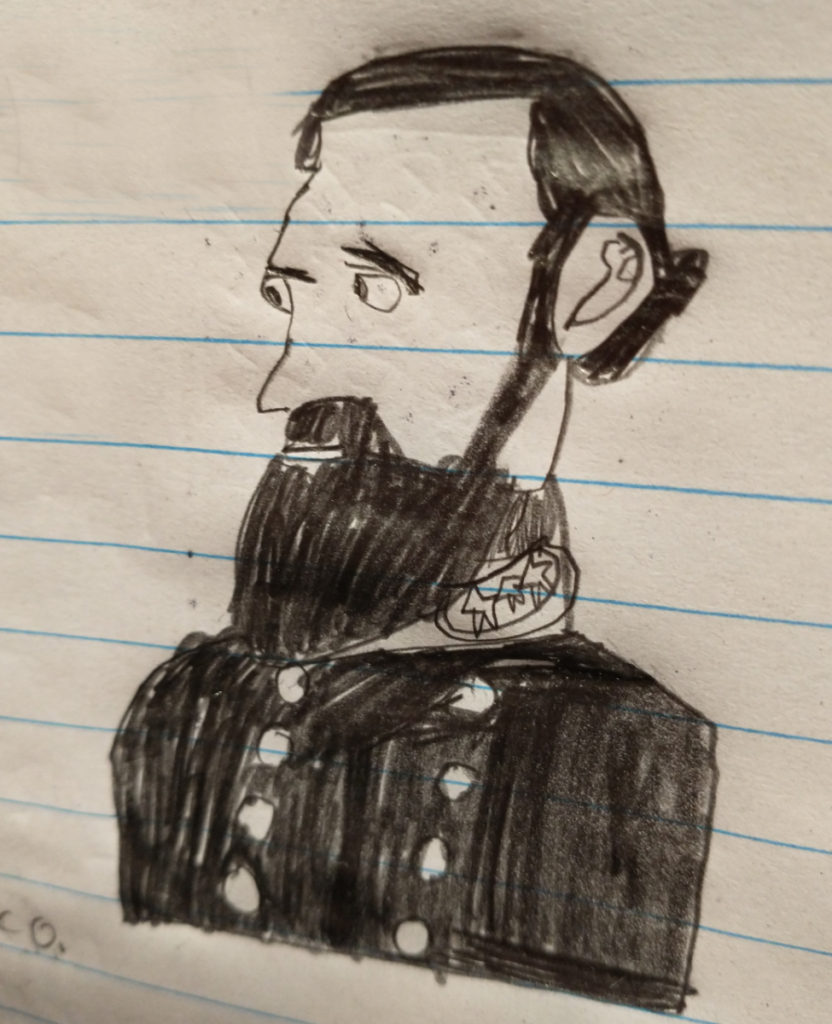
Like Jackson, we too are patriots for the cause of independence. We are traitors to the empire and its godlessness. We are rebels to rootlessness, materialism, and centralization. As poet Allen Tate wrote, “So face with calm that heritage and earn contempt before the age.” So be it.
Ronald Reagan said that what we needed is “an informed patriotism,” and asked the question: “Are we doing a good enough job teaching our children what America is and what she represents in the long history of the world?” Hell, yeah, I am, and always in defiance of the globohomo narrative which aims to enslave us all.
So today, I shall honor the enigmatic Thomas “Stonewall” Jackson, whose 197th birthday is today. I’ve talked about our beloved “Hill Jack” before through an essay written by my eldest son, but this time it’s more about action.
“We cannot indulge a sentimental admiration of the hero if we are to keep our children banal and safe,” notes Anthony Esolen in 10 Ways to Destroy the Imagination of Your Child. “A hero … is like a pack of dynamite, ready to blow any mountain of heaped-up conformity and dullness sky high.”
So, my sons, my mother, and I headed north up I-95 from Richmond. It was one of our many covid-lockdowns-can-shove-it travels that we enjoyed this past summer. Not only did I want to give my kids a sense of normality in the midst of wu-flu hysteria, but I want us to visit as many Southern historical sites as possible before the regime scrubs them all from existence.
First destination on this step back in time? The Stonewall Jackson Death Site in Guinea Station, Virginia.
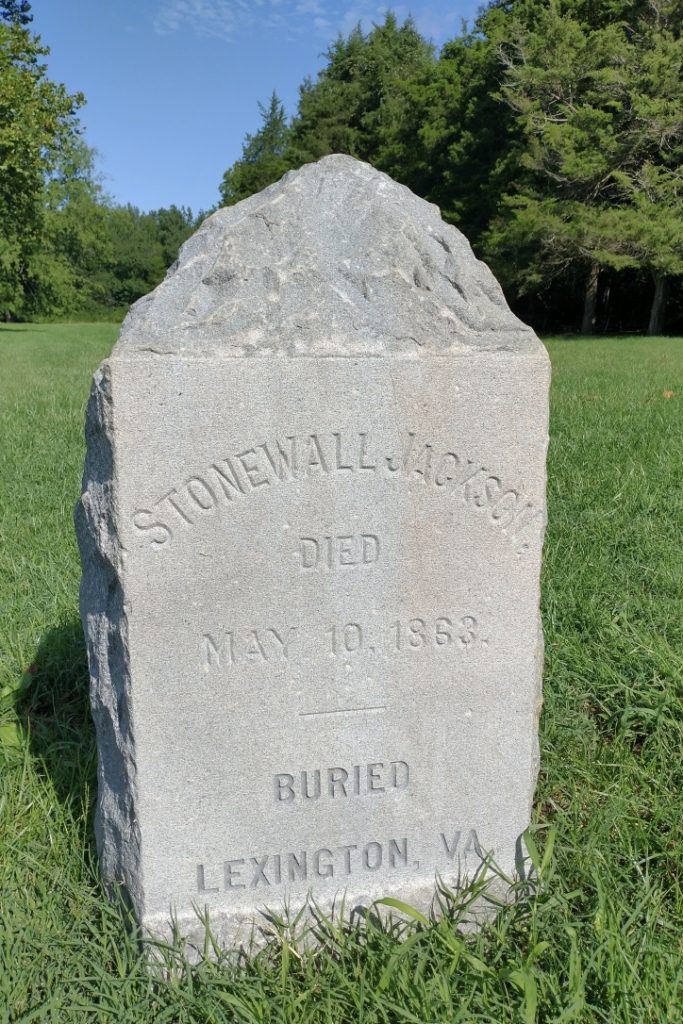
On May 4, 1863, two days after being shot in Chancellorsville, Stonewall Jackson was brought to this house, an outbulding for the Fairfield Plantation in Guinea Station, a busy Confederate supply base. His wife, Mary Anna, and baby daughter, Julia, arrived on May 7. Mary Anna wrote, “his fearful wounds, his mutilated arm, the scratches upon his face, and above all, the desperate pneumonia … wrung my soul.”
On May 10, he told Mary Anna that he was willing to die if it was God’s will and then whispered, “Let us cross over the river and rest under the shade of trees.” The date was Sunday, May 10, and Jackson was only 39 years old. The closest window on the left was the room in which the “Confederate Joshua” passed.

Jackson told Alexander Swift Pendleton, an officer on his staff who was one of the few present with him at Guinea Station, “It is the Lord’s Day. My wish is fulfilled. I have always desired to die on Sunday.” Jackson’s loyal black servant Jim Lewis also stayed at Jackson’s side and was one of a select few given permission to enter Jackson’s sick room at any time. Upon Jackson’s death, Lewis led Jackson’s horse, Superior, in the Confederate general’s funeral processions in both Richmond and Lexington.
From there, we headed 27 miles northwest to Ellwood Manor to see the burial place of Jackson’s “mutilated arm.” The manor dates back to the 1790s and served as headquarters for Union Gens. Gouverneur Warren and Ambrose Burnside during the Battle of the Wilderness, an area spanning around the house, connecting its rolling landscapes, dense forests, marshy tributaries, and few taverns, churches, and sparse residences by poorly traveled paths and backwoods roads.
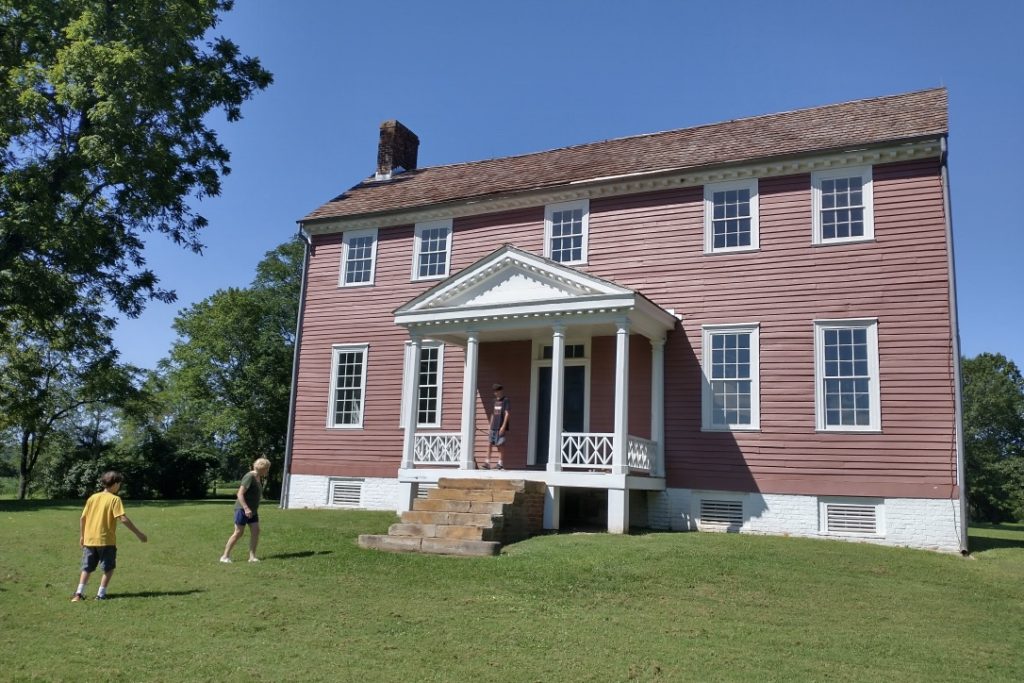
The manor is the only original building still standing that was a witness to the horrors of invasion and war, and the tens of thousands dead and even more maimed physically, mentally, and spiritually. The fierce fights of the Wilderness took place in May 1864, and even though considered a “tactical draw,” this campaign solidified the beginning of the end for the CSA – such stark contrast to the stunning Confederate victory at Chancellorsville just one year prior and a testament to Jackson’s irreplaceable value as a leader.
“The past is like a secret room in an old house, filled with dust and cobwebs, but also rays of light cast upon ancient armor, and odd tools whose use we have forgotten, and books recalling the words and deeds of men and women who once walked the earth, and whose bones now rest in their graves. It is a chamber that strikes one with the sense of holiness, because we come into the presence of those who once were as we are, and who now are as we will be.”
— Tony Esolen
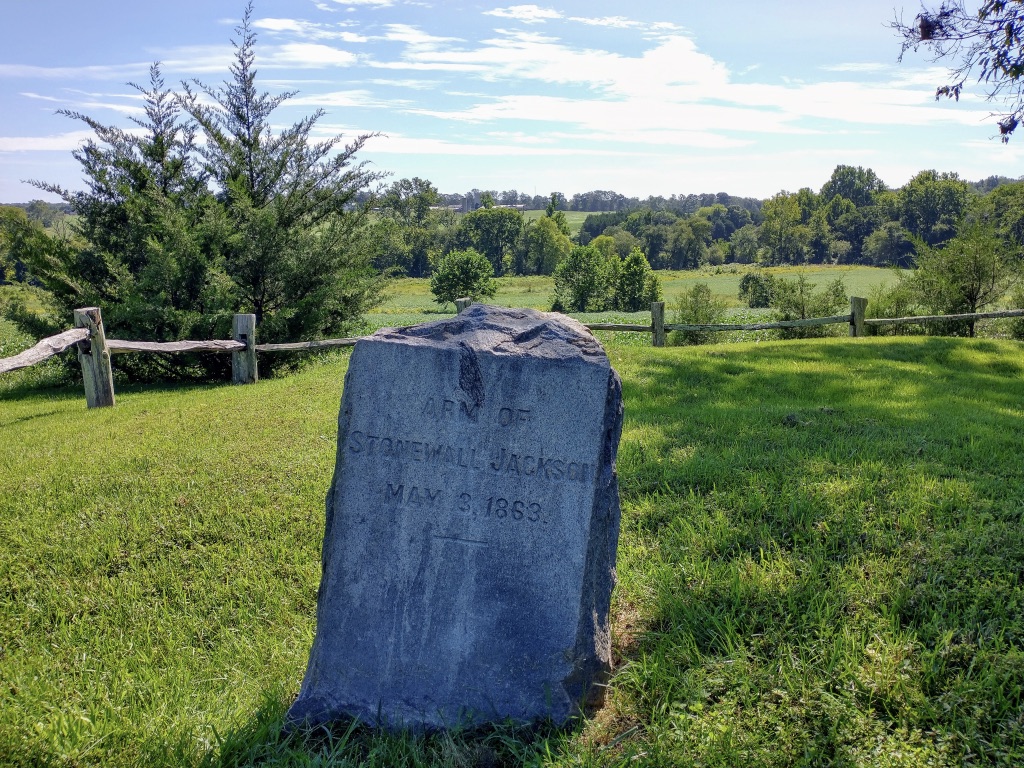
When Jackson was mistakenly shot at Chancellorsville on May 2, 1863, he was taken to a nearby field hospital north of Wilderness Tavern, where his left arm was cut off on the kitchen table of locals William and Rebecca Simms. Jackson’s chaplain, Rev. Beverly Tucker Lacy, then took the general’s limb to bury it in his brother’s family cemetery at Ellwood, as he didn’t think mighty Stonewall’s arm should be cast into the bloody pile of amputated body parts of other Confederates.
From there, we trekked a few miles east of Ellwood to Chancellorsville, which “was not a village but a house” owned by widow Frances Chancellor and her six children.” It was at a “strategic crossroads,” and on May 3, flames finally “consumed the home and drove the family away. It was a six-day battle that raged from May 1-6, 1863, and launched Jackson to worldwide fame.
“Lee won an unlikely victory, but lost Stonewall Jackson,” noted a placard. “The Union army under Gen. Joseph Hooker retreated in a gloomy rain, but would soon be ready to fight again – at Gettysburg.”

“A greater sense of loss and deeper grief never followed the death of a mortal man.”
— One of Jackson’s men
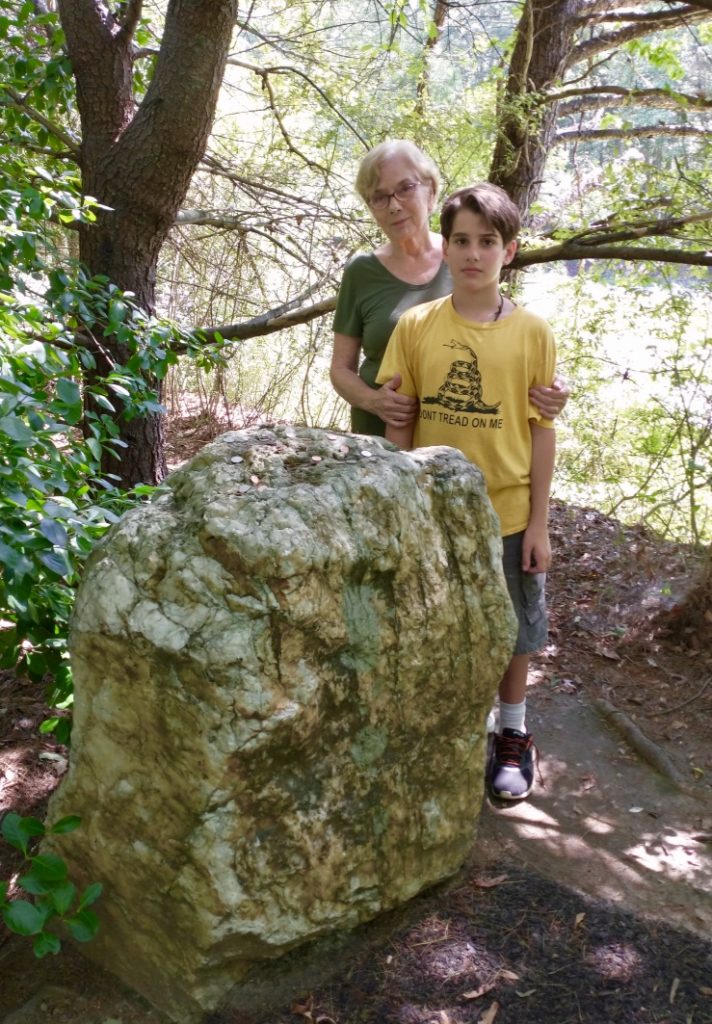
“I rejoice at Stonewall Jackson’s death as a gin to our cause, yet in my soldier’s heart I cannot but see him the best soldier of all this war, and grieve his untimely end.”
— U.S. Gen. Gouverneur Warren Lee
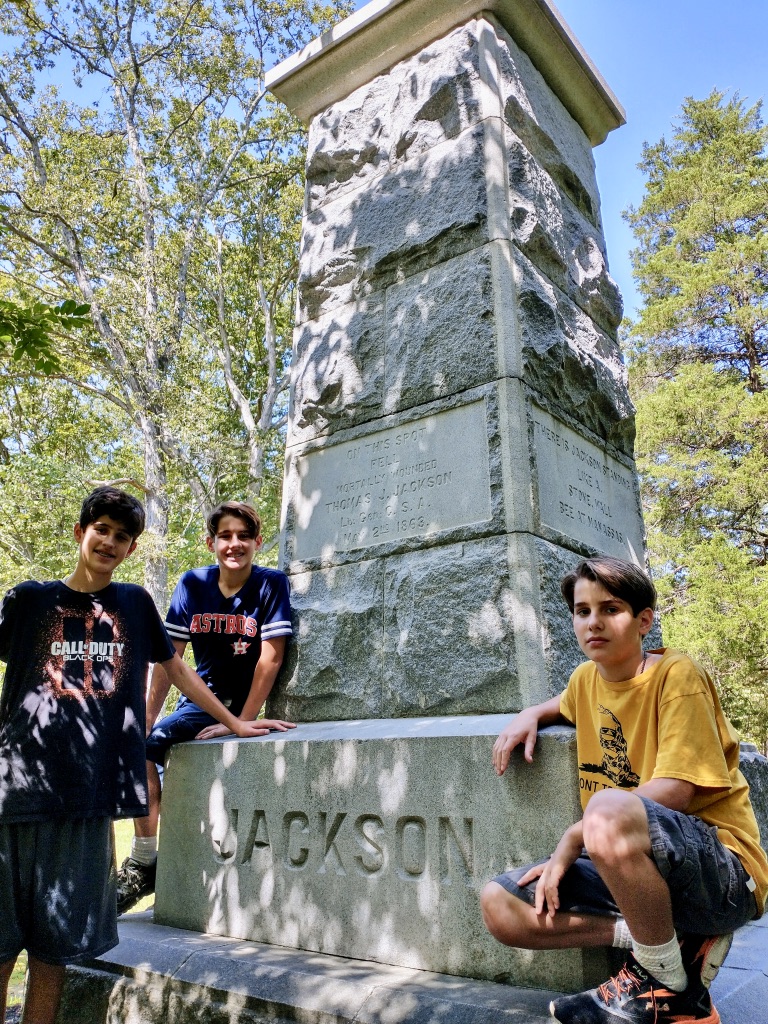
“Never take counsel of your fears.”
— Stonewall Jackson
That day before Jackson’s fateful nighttime recon, he ordered, “You can go forward then,” leading 30,0000 Confederates of his 2nd Corps on a 12-mile march around the Union army and destroyed Hooker’s right wing in one of the most well-known and successful surprise attacks of the War, which occurred across the field my kids are looking toward.
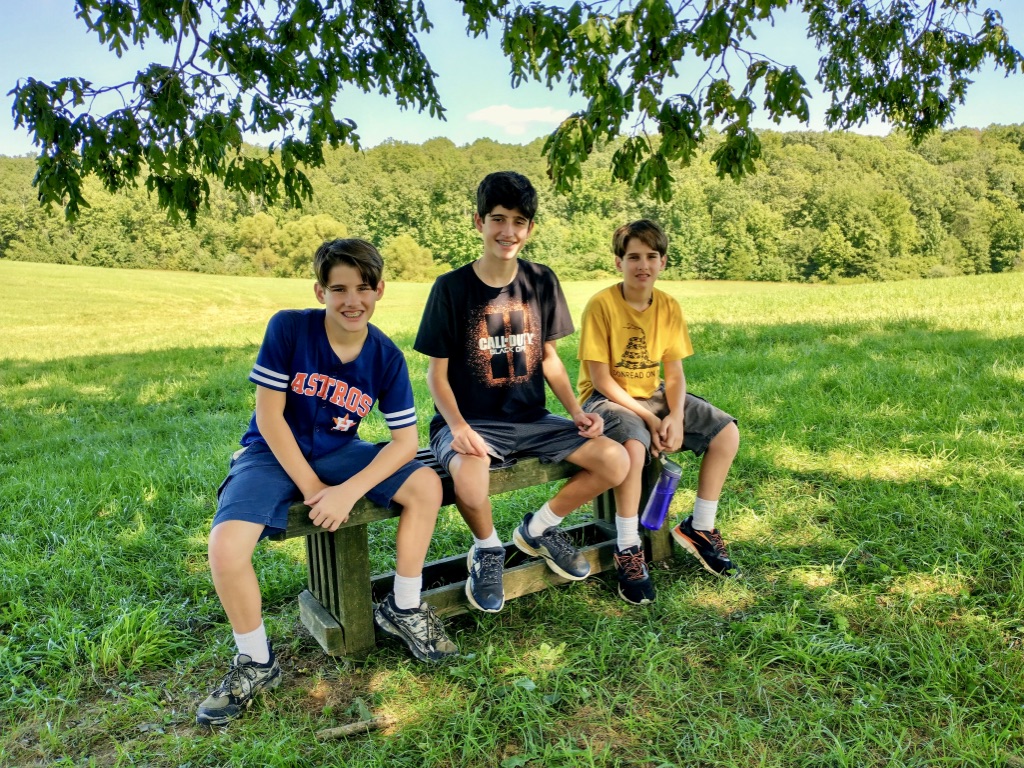
Receiving the brunt of Jackson’s bayonet was the the 11th Corps, a relatively new group of soldiers in the Army of the Potomac. “It’s 11,000 men included a large percentage of European immigrants, men with names like Peissner and Buschbeck, Schurz and Schimmelfennig.” Many fled, giving the 11th Corps the nickname “The Flying Dutchman.”
When Lincoln found out about the 130,000 Feds and their army of foreigners being beaten so badly (even though they dwarfed the Confederate numbers 2 to 1), he cried out, “My God! What will the country say?” Forever the politician is Dishonest Abe. Honorable he is not.
Chancellorsville was a place “bombarded, bloodied, and looted … farms large and small ruined … refugees by the thousands forced into the countryside” with more than 30,000 combined casualties, “most now in graves unknown.” Yet, it was a “virtuous tragedy that freed 4 million Americans and reunited a nation.” Now, that’s what you call sticking to the narrative. Don’t ya just feel all that liberty and solidarity, folks?
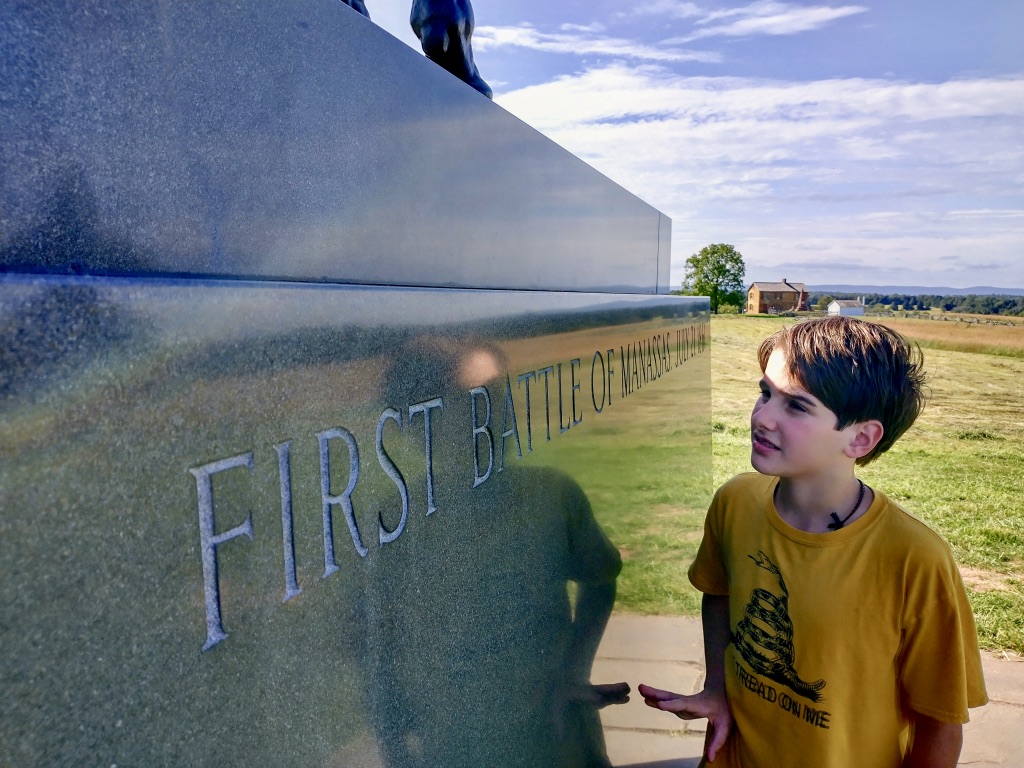
Our last stop of the day was about 50 miles due north: Manassas, or as the Yankees call it, Bull Run. The First Battle of Manassas took place on July 21, 1861. It was the event that catapulted Jackson onto the world stage and gave him his legendary nickname, forever immortalizing him as “Stonewall.”
As one of the most revered generals in history, Jackson led his men from the front, taking them into battle himself. His courage and selflessness inspired his troops to be the fiercest and most loyal warriors of the Late Unpleasantness.
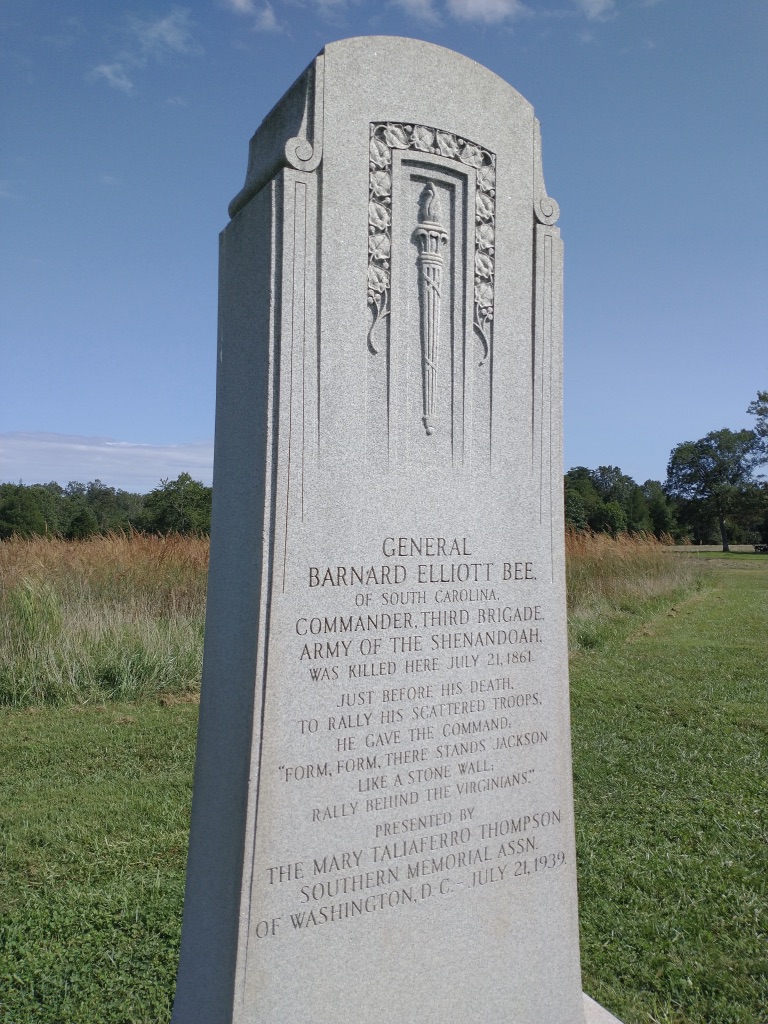
In a letter to his wife after First Manassas, Jackson wrote, “Yesterday, we fought a great battle and gained a great victory, for which all the glory is due to God alone.”
Civilians from nearby Washington, D.C. picnicked on a hill to watch this first major battle of what they assumed would be a quick War, hoping that the Union would handily defeat the Rebs. But instead, the US lost nearly 1,000 more men than did the South, so the Federals retreated and onlookers fled in horror, proving to everyone that the Confederates were a formidable foe not to be underestimated. You invade a man’s homeland, and that’s a serious affront.
Honor and duty, and defending their homes and their rights is what Jackson and his soldiers fought for. Not conquest, not Total War, but simply the desire to be left alone. It’s all we good Southerners want today.
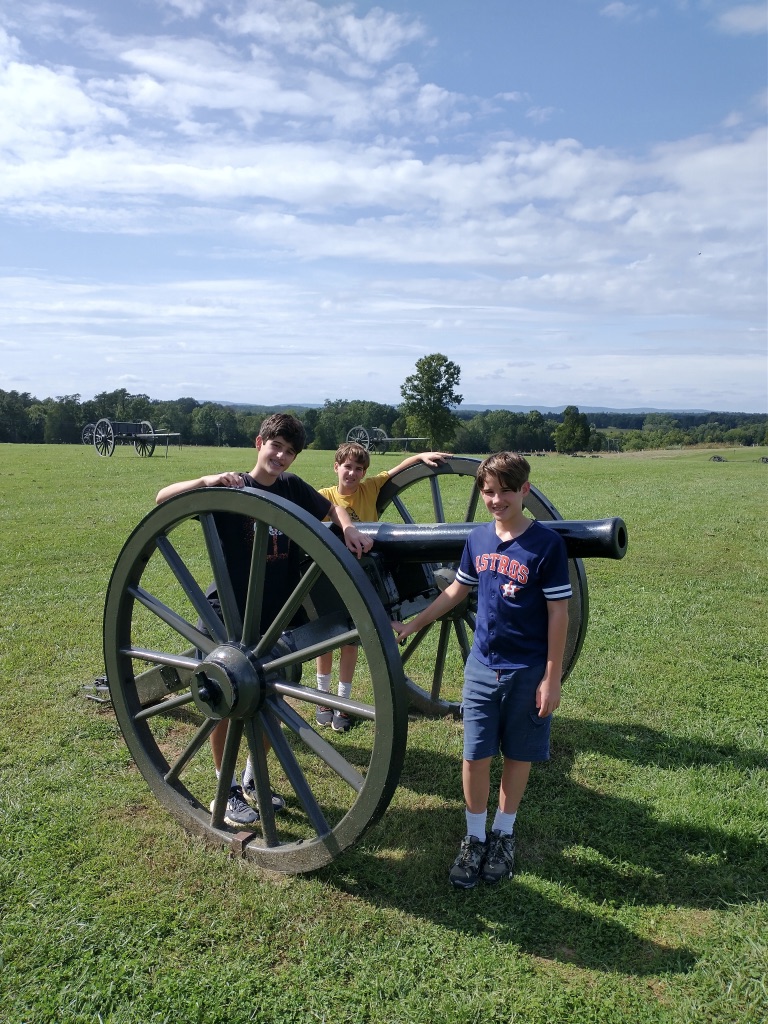
The Second Battle of Manassas raged from August 29-30, 1862. Lee, accompanied by Jackson and a few other of the CSA’s ablest commanders, won an astounding victory. Despite the fact that the Rebs were greatly outnumbered by 20,000 troops, the Union suffered double the casualties, losing more than 14,000 men to the South’s 7,000.
“We are in the process of losing history and, therefore, any meaning for our life that is more than a rapidly passing moment,” remarks Clyde Wilson. And he is right, which is why we’re teaching our boys to know the past, to slow down, to take note, to ask questions, to challenge the status quo, to seek truth, to be brave, and to trust God – to “feel as safe in bed as in battle,” as Jackson would say.
Here’s an example of some of the fruits of those virtuous lessons we’re trying to impart to our progeny, all while maneuvering our way around this soul-crushing dystopia the elites have created only for their own benefit.
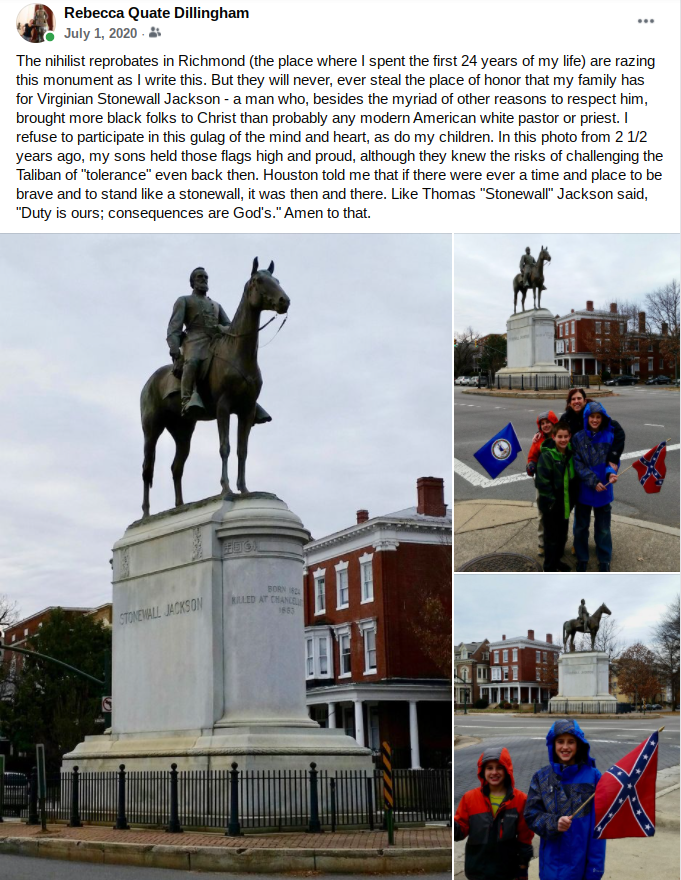
Unfortunately, a first cousin of mine (who just recently relocated back to Richmond after living for decades up North) doesn’t share our zeal for time and place, and kith and kin. Here’s her triggered retort to my post, followed by my smack-down. Scalawags are just the worst, but they do make for good statist foot soldiers.

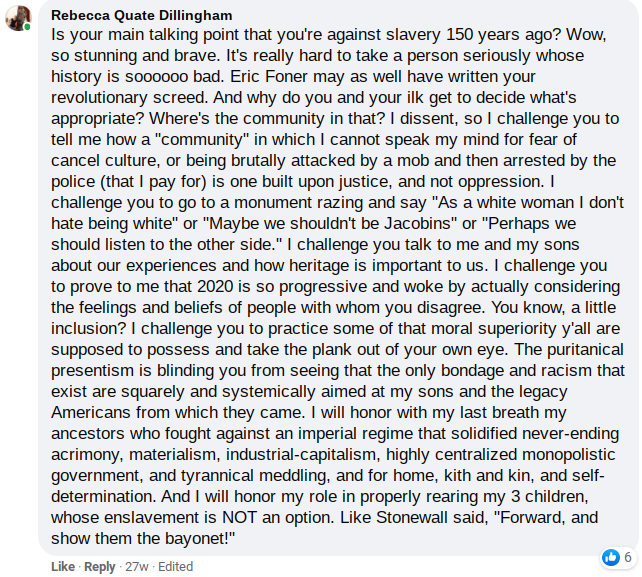
“We must endeavor to follow the unselfish, devoted, intrepid course he pursued,” advised Lee to his fellow Confederates after Jackson’s death. So even though our culture may be utterly degraded, that doesn’t mean we have to participate in the degradation and in our collective suicide.
Let’s break free from the gulag of the mind, and forget the frauds with their casual tales and corrupt schemes. Instead, let’s remember, celebrate, and emulate men of true character, and build up our sons to lives of honor. Every, single day and at all costs. This is how we can make our own future.
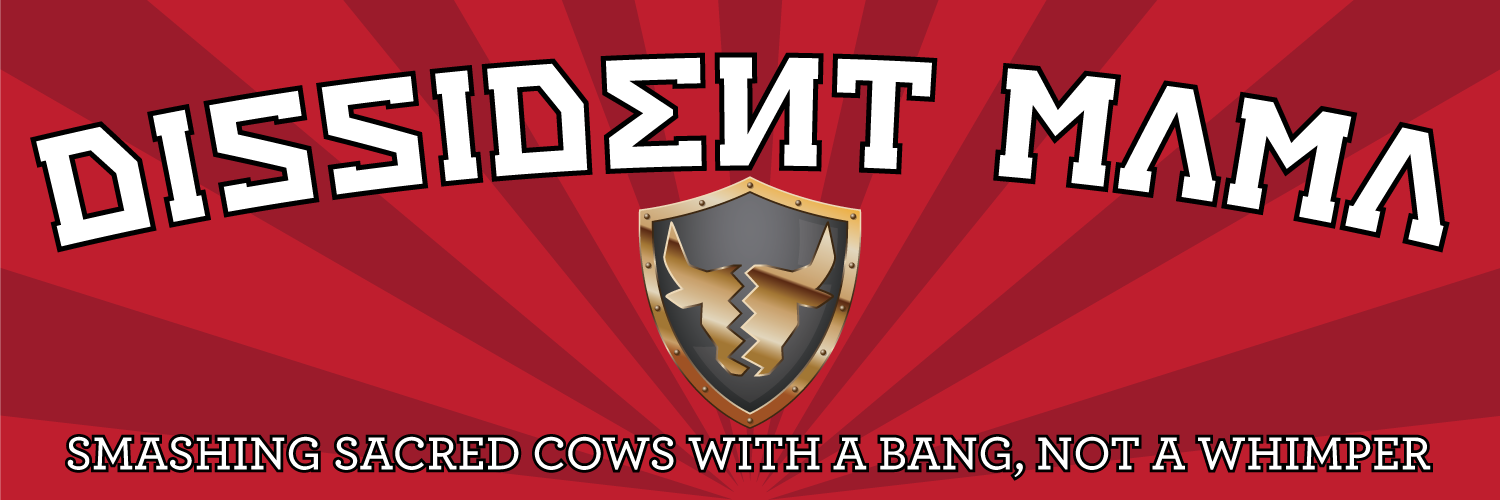
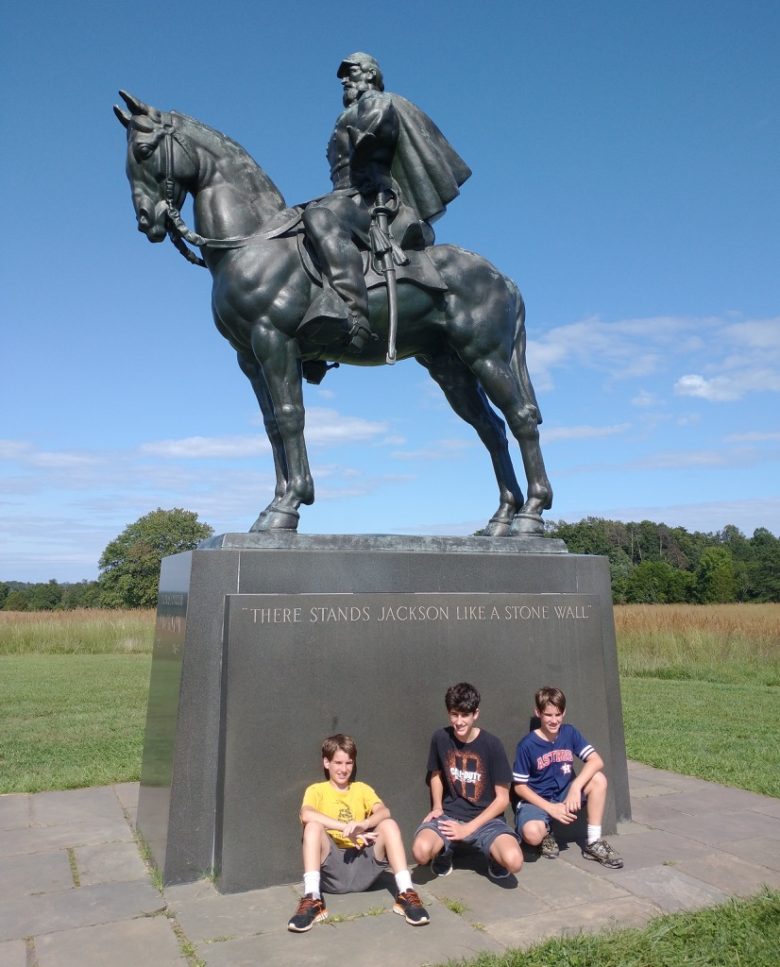

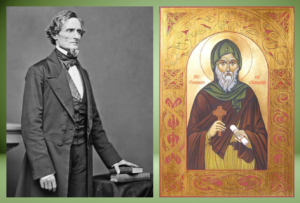
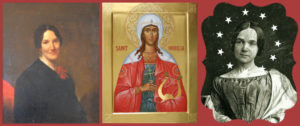
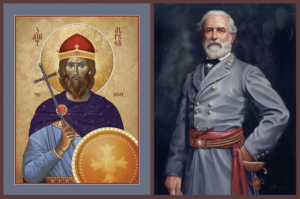
Comments
MLK said, “If we are wrong, God Almighty is wrong.”
I firmly believe no real Christian leader, regardless of their politics, can blatantly say something like this, however convinced they are of the righteousness of their cause.
Wow, now there’s one I haven’t heard. MLK sure is the gift that keeps on giving. Truly, a shocking statement from a Christian standpoint, but certainly just your average fare from a commie perspective.
Thanks for reading, GJ. Hope to hear from you again. 🙂
I think it was a PBS documentary. Up until then, I had not had any particular feeling about MLK. But that statement alone (about 4 seconds long) was enough to make me realize what kind of Christian he was.
“What are you prepared to do?”, a quote I cited yesterday at another site, taken from the character of Malone, famously portrayed by Sean Connery in The Untouchables.
That’s a question many of us are asking – or ought to be – in the days to come. BigCon, Conservative Inc., as well as all the Wokesters out there needn’t bother! But you and I had better give some serious thought to it, because they’re coming to take more than just our monuments away, methinks!
Thanks again, DM!
I think we need a multifaceted and balanced approach: part takeover of local and regional politics, part building up of community especially in our churches, part prepping for poop to hit the fan, part making our families as strong and healthy as possible. That’s my two cents quickie thought, but I don’t think there’s any ONE thing that will help us to survive and thrive the possible coming onslaught. I hope to blog about it soon, and have been reading many other people’s takes, so if you have any good ideas, please do share your thoughts.
I believe you’re spot-on, DM: one size doesn’t necessarily fit all. We must be adaptable, ready to do what needs doing, chiefly where we live, whilst maintaining perspective from our brethren in other areas/regions. I think I may have made reference to one of Jon Harris’s recent posts on YouTube -which complements so much of what you’ve written -; perhaps you’ve seen it:
He begins in prayer and then lists several things we all should be doing: 1) “Cut out the fat”: not only literally, getting into/back into good physical condition, but also eliminating those pursuits (and addictions) in our lives that distract from the priorities demanded in these times; 2) Online Security/Alternative Social Media: Get away from BigTech, and start looking into VPN’s, DuckDuckGo, etc.; 3) Physical Goods: Food, water, etc.; 4) Organize: Do what our forefathers did: form the 21st c. version of Committees of Correspondence (thus the importance of Item #2), form militias for mutual defense and uphold the law -not the tyrrants’ make-it-up-as-they-go-along version – but the inalienable rights given by God and ennumerated in the Bill of Rights (which also implies responsibilities). This also means forming alliances with “lesser magistrates” who believe in the same.
This is one of the most practical, boots-on-the-ground treatments I’ve seen, daring to go where others aren’t. You and I can’t do much about the evils in DC, but I’ll bet we can put into practise a good deal of what Brother Harris is talking about, and right here in our respective localities!
Will check it out. Jon’s a smart and bold guy so I’m not surprised he’s on it.
However, we can do NONE of this until good folks stop caring about being called bad names (in fact, we should probably embrace the slurs) AND we must stop virtue signaling!!! That is one of the right’s biggest weaknesses. Being called a Nazi or a racist must roll off of one’s back, and unfortunately, many people STILL aren’t there yet. You can’t very well build something strong and effective if no one has anyone else’s back when the heat gets turned up. I wrote about this in the show notes for my Kessler podcast … check it out and let me know what you think. http://www.dissidentmama.net/dissident-mama-episode-27-jason-kessler/
SIGH!!!
Sadly, you’re right about caring too much about slurs and bad names: too long have we been inundated with claptrap about ever and always obeying the 11th Commandment (i.e. “Thou shalt be nice!”)!
I confess, I care to some degree, but when I see the things I love being sacrificed for . . . what?!!? Being thought “nice” and respectable by people who either openly want to destroy me or mine, or at best, are entirely non-chalant about it? I read a recent quote from G.K. Chesterton – maybe it was here. I don’t remember – but he said something to the effect that a soldier fights, not because of the enemy in front of him, but because of those behind that he loves.
We’ll all need to remember that in the days to come, I think!
I’ll check out that podcast, BTW.
Very good point. To be fair, it is more difficult to not care about being called a Nazi when it could get you fired from your job. And these leftist nut-jobs want to ruin you and your family if you hold opinions adverse to their own. But then again, making enemies of these sorts of villains is unavoidable for a man or woman of principle.
Don’t trust a man who’s afraid to have enemies. Christ, the archetype of masculinity, had plenty and still does!
Love that Chesterton quote! Losing our jobs and becoming unemployable is a risk – I fear it every, single time I publish a blog post or release a podcast – and that is why we must have each other’s backs. Build alternative systems. Create parallel institutions. It’s going to be difficult, but there is nothing more necessary because our enemies are truly evil. Like the Good Book says, “He that taketh away his neighbour’s living slayeth him; and he that defraudeth the labourer of his hire is a bloodshedder.” – Ecclesiasticus 34:22
Yes very true. Building good organizations is the key. Some, like the Republican Party, need to be abandoned completely. Others, like the Catholic Church, need to be recaptured and restored to their original purpose and promise.
How about the Rural Independence Party?
Wanted so badly to “like” your response to your cousin’s sadly ignorant comment, but could not. G-d bless you for standing tall, DM!
Thanks so much, Rob. I feel your thumbs-up in spirit!! It was a fun response to write … I mean, the self-righteousness of the anti-Southern haters is so sickening because it is built on such fantastical stupidity, while also co-opting the codes of civility and morality upheld by those very same people they’re trying to tear down. So any time I can poke a hole in their madness, I try my best.
They judge others from their precarious perch of morality, built upon the remnants of the Christian edifice written in their hearts from God and the earthly inheritance of Christian civilization, disregarding Christ’s wisdom that you’ll be judged as you judge others, and instead of giving righteousness to God in humility, they pervert His Law into a license for self-righteousness and conceit.
It’s pretty easy to oppose slavery now. It was a bit more difficult back then when everybody’s livelihoods depended upon it.
https://media4.giphy.com/media/RrVzUOXldFe8M/giphy.gif
It is every man’s duty to provide for his family, and this means first and foremost to provide a measure of security against would-be invaders.
My husband and I were just saying this morning that we need to read Machabees. It’s in the Orthodox Study Bible so not sure why this just dawned upon us. Thanks for the inspiration!
I’m just getting into what traditional Catholics call the Deuterocanonical texts myself, which include Machabees 1 and 2.
The split between Eastern and Western Christianity occurred long before the translation of the Douay-Rheims Bible, or DRB, (around 1600), but this bible is an English translation of the Latin Vulgate Bible translated mostly by St. Jerome around 400. I’m not sure if the Orthodox recognized the Latin Vulgate Bible at any point in history, but it has become my preferred Bible, since the KJV, my most recently preferred, was influenced by early Protestant translations. Anyways, the DRB includes these Deuterocanonical texts, and the KJV does not.
I found this [great online resource] which has the Douay-Rheims (Fr Challoner revision ~1750) English alongside the Latin Vulgate for comparison.
Pingback: Orthodox America Has a Lost Cause Problem - Public Orthodoxy